THE GHOSTS OF CHRISTMAS PRESENT
Race and immigration are popular topics on the LA stage, at least when it comes to more serious theatre. And there is good reason for this. LA is an incredibly multiracial and multicultural city that can be incredibly welcoming to non-white immigrants as well as threatening, persecuting and deadly. Some of the more successful plays in this vein that have graced our city in recent years include The Chinese Massacre (Annotated) by Tom Jacobson and The Romance of Magno Rubio at [Inside] the Ford. Both involved multiracial casts speaking in multiple languages – often without translation – and chronicled the Asian immigrant experience on the West Coast.
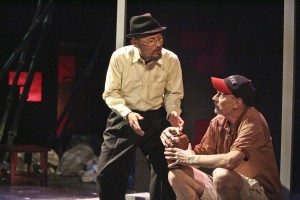 In contrast to these earlier plays, Christmas in Hanoi, a world premiere production by East West Players, is more about the immigrant experience across generations rather than that experienced by the first generation. Additionally, it involves the simultaneously nostalgic and disconcerting experience of returning to one’s country of origin. The show’s talented, multiracial cast, as one might expect, speaks English, French and Vietnamese, adding to the story’s authenticity. Knowledge of the latter two languages, however, is not essential for following the story.
In contrast to these earlier plays, Christmas in Hanoi, a world premiere production by East West Players, is more about the immigrant experience across generations rather than that experienced by the first generation. Additionally, it involves the simultaneously nostalgic and disconcerting experience of returning to one’s country of origin. The show’s talented, multiracial cast, as one might expect, speaks English, French and Vietnamese, adding to the story’s authenticity. Knowledge of the latter two languages, however, is not essential for following the story.
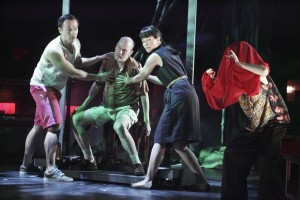 The central mystery at the heart of Eddie Borey’s Christmas in Hanoi is why the Ganley family is going to Vietnam for Christmas. Philip Ganley (Michael Krawic) hasn’t returned to Vietnam since the war, where he worked in intelligence during the Vietnam War and met his wife Oanh (Elyse Dinh), who died the previous year. He claims to want to bury a part of her there, though his urn only carries dirt from her grave. Philip’s mixed race daughter Winnie (Elizabeth Liang) believes there is more to the trip than she is being told. Her spoiled younger brother Lou (Joseph Daugherty), however, isn’t concerned. He drinks cocktails with his drunken dad and hopes to meet up with a friend for a night of boozing and cruising. While in Nha Trang, Winnie discovers that her grandfather, George Tran (Long Nguyen), the fourth member of the traveling party, is planning to consult a spirit medium in Hanoi.
The central mystery at the heart of Eddie Borey’s Christmas in Hanoi is why the Ganley family is going to Vietnam for Christmas. Philip Ganley (Michael Krawic) hasn’t returned to Vietnam since the war, where he worked in intelligence during the Vietnam War and met his wife Oanh (Elyse Dinh), who died the previous year. He claims to want to bury a part of her there, though his urn only carries dirt from her grave. Philip’s mixed race daughter Winnie (Elizabeth Liang) believes there is more to the trip than she is being told. Her spoiled younger brother Lou (Joseph Daugherty), however, isn’t concerned. He drinks cocktails with his drunken dad and hopes to meet up with a friend for a night of boozing and cruising. While in Nha Trang, Winnie discovers that her grandfather, George Tran (Long Nguyen), the fourth member of the traveling party, is planning to consult a spirit medium in Hanoi.
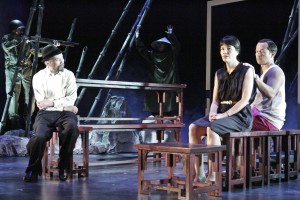 While Christmas in Hanoi starts out as a fairly conventional family story, it gets weirder and weirder as the show progresses toward its puzzling climax. The central figure behind the mystery is Oanh Ganley. Although she is physically dead, she is very much alive to the rest of the family. Her husband, Philip, still mourns her death. Her son, Lou, hears her voice and sees visions of her. Her father, George, also mourns her and desires to fulfill the Vietnamese custom of reburying the dead several years later (though she has only been dead for one year?). Finally, her daughter, Winnie, is plagued by memories of her mother’s disapproval, especially of the boyfriends she brought home. Most significantly, what Winnie constantly asks is why she, who did everything right, could not please her mother, whereas her mother loved and spoiled her superficial, profligate brat of a brother.
While Christmas in Hanoi starts out as a fairly conventional family story, it gets weirder and weirder as the show progresses toward its puzzling climax. The central figure behind the mystery is Oanh Ganley. Although she is physically dead, she is very much alive to the rest of the family. Her husband, Philip, still mourns her death. Her son, Lou, hears her voice and sees visions of her. Her father, George, also mourns her and desires to fulfill the Vietnamese custom of reburying the dead several years later (though she has only been dead for one year?). Finally, her daughter, Winnie, is plagued by memories of her mother’s disapproval, especially of the boyfriends she brought home. Most significantly, what Winnie constantly asks is why she, who did everything right, could not please her mother, whereas her mother loved and spoiled her superficial, profligate brat of a brother.
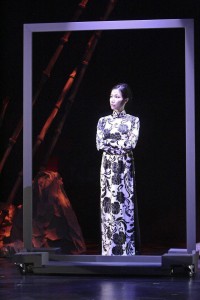 What playwright Borey does is to slowly draw out the fraught relationships among family members and especially between the generations. Winnie and Lou cannot speak Vietnamese and feel like strangers in Vietnam. Winnie especially finds conflict between her scientific worldview and the more supernatural (superstitious?) worldview of her grandfather George. It is only when she begins to suspend her disbelief that she is able to make peace with herself, her family and her inherited Vietnamese culture.
What playwright Borey does is to slowly draw out the fraught relationships among family members and especially between the generations. Winnie and Lou cannot speak Vietnamese and feel like strangers in Vietnam. Winnie especially finds conflict between her scientific worldview and the more supernatural (superstitious?) worldview of her grandfather George. It is only when she begins to suspend her disbelief that she is able to make peace with herself, her family and her inherited Vietnamese culture.
Much of the weirdness in Christmas in Hanoi centers on the many roles of actress Elyse Dinh. In addition to the minor parts of movie grandma, honeymooner and beggar, she plays Oanh Ganley, the spirit medium in Hanoi and the Cham ghost. This interesting casting choice gives her mother persona a dark, macabre aspect, which casts a shadow on some creepy scenes in a temple and a cemetery that come across as rather opaque and bewildering. Whatever Borey was aiming for is not readily apparent and could have been spelled out more clearly.
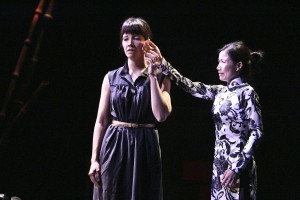 Frequent scene changes slow down the pace of the show, which runs about two hours. There are moments of excitement and comedy, but plenty of introspection. Under Jeff Liu’s direction, the quality of acting is uneven. Many of Dinh’s characters come across as caricatures as does Krawic’s loud-mouthed Philip Ganley. Nguyen’s George Tran is perhaps the most delightful and mischievous character. Daugherty’s Lou Ganley seems rather bland and easily the least interesting character of the cast. It is Elizabeth Liang’s Winnie Ganley that makes the show as successful and compelling as it is; she runs the gamut of emotions and portrays her role with great complexity, depth and development of character.
Frequent scene changes slow down the pace of the show, which runs about two hours. There are moments of excitement and comedy, but plenty of introspection. Under Jeff Liu’s direction, the quality of acting is uneven. Many of Dinh’s characters come across as caricatures as does Krawic’s loud-mouthed Philip Ganley. Nguyen’s George Tran is perhaps the most delightful and mischievous character. Daugherty’s Lou Ganley seems rather bland and easily the least interesting character of the cast. It is Elizabeth Liang’s Winnie Ganley that makes the show as successful and compelling as it is; she runs the gamut of emotions and portrays her role with great complexity, depth and development of character.
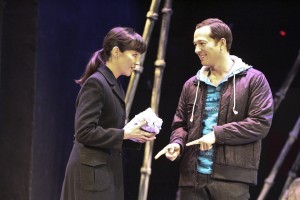 As a new play that illustrates the multigenerational experience of Vietnamese immigration to the US, Christmas in Hanoi is somewhat original, thought-provoking and entertaining. Unfortunately, its preoccupation with (seemingly?) real ghosts, while perhaps giving it an authentically Vietnamese flavor, distracts from the inner ghosts each character struggles with, which comprise the more compelling drama of the production. Audiences expecting the play to address the horror of the Vietnam War will be disappointed as Philip Ganley explicitly admits that he never saw combat during the war, concluding that it is not guilt that plagues him. While audiences can expect a quality production that boasts some fine performances and a few laughs, it is not one that is likely to move the heart or make a lasting impression in the memory.
As a new play that illustrates the multigenerational experience of Vietnamese immigration to the US, Christmas in Hanoi is somewhat original, thought-provoking and entertaining. Unfortunately, its preoccupation with (seemingly?) real ghosts, while perhaps giving it an authentically Vietnamese flavor, distracts from the inner ghosts each character struggles with, which comprise the more compelling drama of the production. Audiences expecting the play to address the horror of the Vietnam War will be disappointed as Philip Ganley explicitly admits that he never saw combat during the war, concluding that it is not guilt that plagues him. While audiences can expect a quality production that boasts some fine performances and a few laughs, it is not one that is likely to move the heart or make a lasting impression in the memory.
photos by Michael Lamont
Christmas in Hanoi
East West Players
David Henry Hwang Theater at the Union Center for the Arts
scheduled to end on March 10, 2013
for tickets, call 213-625-7000 or visit East West Players
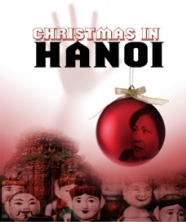
{ 3 comments… read them below or add one }
I’m not sure I agree with this review. As a sporadic theater attendee, I was dragged to this show by my friend — and I was surprised by how moving and entertaining it was. This reviewer does not understand the simple fact that this play is a ghost story — with the “weirdness” as he calls it being all the supernatural stuff which was introduced in the first moments of the play (and it’s really cool and creepy at times). It’s like this reviewer didn’t even listen to the dialogue; for example, they explicitly state that they aren’t going to Vietnam to bury the mother, so why the confusion? I’m not mixed race or anything and this play still got to me. The LA Times understands much better when it says the play is “rich with mystery and emotion”. So does Stage Scene LA which gave it its highest “Wow!” rating. This blog has lazy reviewers I guess. Too bad.
Mr. Johnson:
Yes, the LA Times does indeed claim that this play is “rich with mystery and emotion,” but it also states that this is a “drama that may not pay off all its plot points” and that “ultimately, instead of solving the mystery he has painstakingly set up, Borey settles for a sweeping indictment of generalized American culpability. By revisiting the obvious, Borey shortchanges the specific – namely, the particular flaw that plunged the Ganley family into horror. It’s a too-easy resolution.”
And Stage Scene LA, which has one sycophantic reviewer, gives a “Wow!” rating to almost all of the hundreds of shows he reviews every year.
So, if you do not agree with a reviewer, that makes the critic lazy? If you read with discernment, you would realize that Mr. Hughes’ confusion is summed up with, “Whatever Borey was aiming for is not readily apparent and could have been spelled out more clearly.” And you prove yourself a scoundrel by cutting and pasting five words from another review to substantiate your opinion, when the Times and our reviewer are basically saying the same thing.
Also, “blog” is short for Web Log, which is an on-line diary. Stage and Cinema is not now, nor has ever been, a blog.
So, instead of simply telling our readers why you liked the play (and should have left it at that), you decided to deride our site. Apparently, Stage and Cinema can attract lazy readers. Too bad.
Here is a review which substantiates Mr. Hughes’ thoughts that I thought your readers would be interested in.